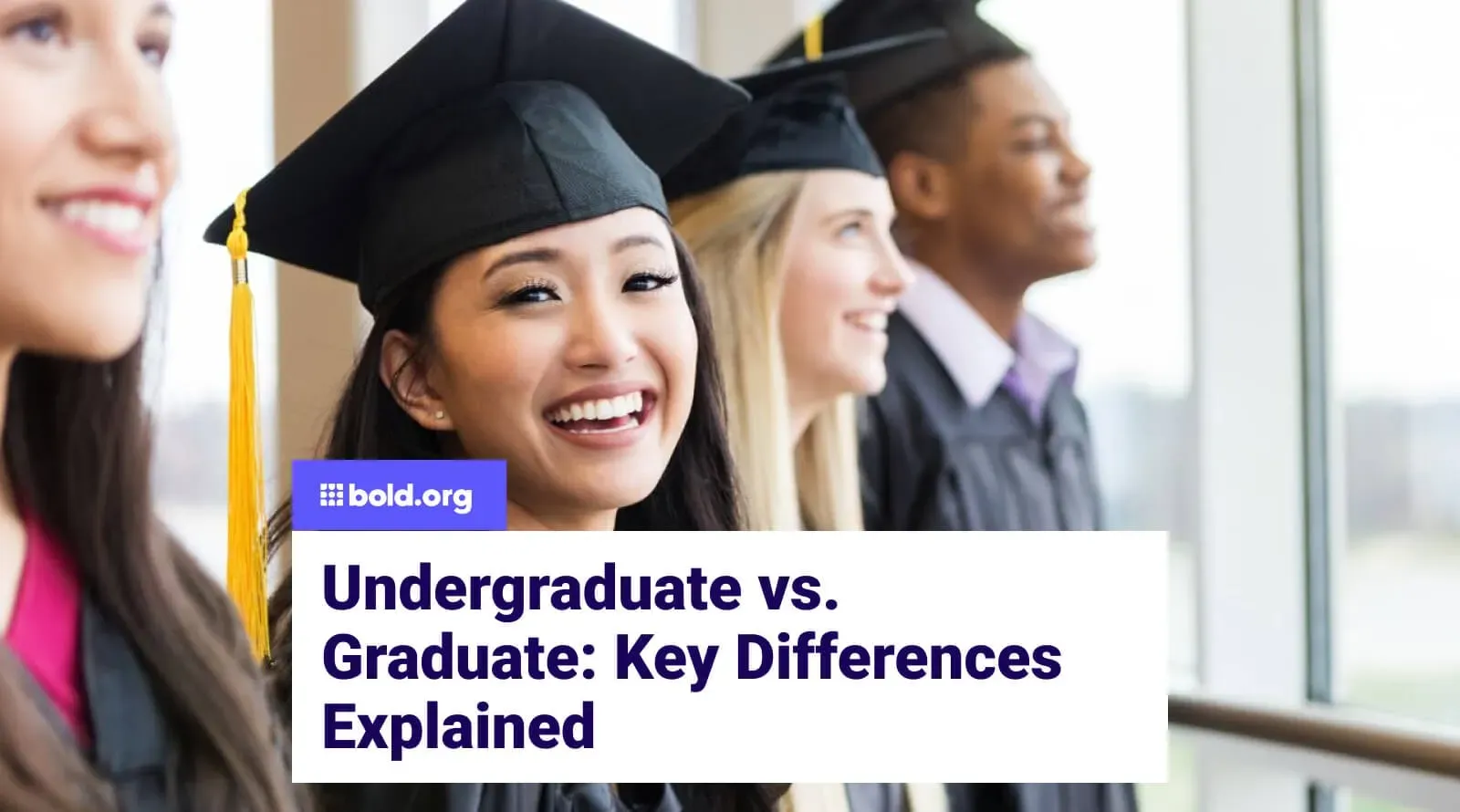What Is the Difference Between College and University?

Are you confused about the distinction between college and university? Many people use these terms interchangeably, but there are some differences. Colleges are usually smaller, focused on undergraduate education, and provide a more intimate learning experience. Universities are larger and emphasize research and innovation.
When deciding between a college and a university, consider your career goals, preferred learning environment, and the range of opportunities each institution offers. Consider visiting campuses, talking to current students, and researching the curriculum and faculty expertise to make an informed decision. Remember, the right choice is the one that aligns with your aspirations and empowers you to succeed on your educational journey.
Get Matched to Thousands of Scholarships
Create your Bold.org profile to access thousands of exclusive scholarships, available only on Bold.org.
Create Free ProfileIn this Bold blog, we'll explore the definitions of both colleges and universities and delve into the historical context. We'll also examine the structural differences, degree offerings, and student experience at each type of higher education institution here. Finally, we'll help you weigh the factors to consider when choosing between college and university. Let's get started!
Browse these tips on how to successfully transition to college!

Definitions of College and University
Let's begin by understanding what exactly is meant by the terms "college" and "university." At the same time, there may be regional variations in how the terms are used. The term "college" holds varying interpretations across different countries, confusing prospective international students considering studying in the United States.
Generally, a college is a smaller institution offering undergraduate programs like community colleges, technical and vocational colleges, and liberal arts colleges. On the other hand, a university is a larger institution that offers both undergraduate and postgraduate programs.

What is a College?
A college typically focuses on providing undergraduate education in a specific field or a range of related areas. Colleges typically have smaller student populations, intimate campuses, and a more limited range of program offerings. Most of these institutions operate as private entities and rely less on state funding.
Consequently, colleges might place less emphasis on research endeavors and, in some cases, have strong religious affiliations. Additionally, it's worth noting that the term "college" encompasses a broader spectrum, including community, vocational, and technical colleges. In contrast, a minority of these establishments offer bachelor's degrees; most primarily grant associate degrees and certificates.
What is a University?
Universities encompass public and private institutions that provide a wide array of academic opportunities catering to undergraduate and graduate students. Renowned for their vibrant and diverse atmospheres, these establishments often boast spacious campuses and a rich selection of program offerings to cater to diverse interests and career paths. While numerous universities boast large student bodies like public universities, it's essential to note that not all universities share this characteristic, and some institutions may be smaller.
Some distinguishing features of universities are their wide range of academic departments and research opportunities. They often have dedicated research centers and state-of-the-art facilities, enabling students and faculty to engage in cutting-edge research.
Choosing a college or university can be challenging. Check out useful information on how to choose a college now!

Historical Context of Colleges and Universities
Universities and colleges have a rich historical context that spans centuries and civilizations. Ancient societies like Mesopotamia, Egypt, Greece, and Rome laid the foundation for specialized education in various fields. However, as we recognize them today, the concept of universities emerged during the medieval period in Europe.
These institutions became centers of learning attached to cathedrals and monasteries, offering education in liberal arts, law, medicine, and theology.
The Renaissance and Enlightenment further contributed to the expansion of universities, emphasizing reason, science, and intellectual progress. The rise of modern nation-states in the 19th and 20th centuries led to the establishment of comprehensive university systems with a stronger focus on research and technological advancement.
In recent times, globalization and technological advancements have fostered greater international collaboration and diversified the fields of study. Today, colleges and universities continue to evolve to meet the ever-changing demands of society, playing a crucial role in knowledge dissemination, professional training, and fostering critical thinking.
Differences in Terminology: A Global Perspective
It's important to note that the terminology used to describe educational institutions varies across different countries. In some parts of the world, the terms "college" and "university" are used interchangeably, while in others, they carry distinct meanings. This can sometimes cause confusion when comparing educational systems across countries.
In the United States, for example, colleges are typically smaller institutions that offer undergraduate degrees. Conversely, universities are larger institutions that offer a wider range of programs, including graduate and professional degrees. In contrast, colleges in countries like the United Kingdom are often specialized institutions that focus on specific subjects, while universities offer a broader range of programs.
Furthermore, the historical development of higher education institutions has also influenced the terminology used. For instance, in some European countries, the term "university" is reserved for institutions that have been granted a royal charter or have a long history of academic excellence. This distinction highlights the cultural and institutional differences within the global educational landscape.
In some countries, the term "college" refers to secondary or high schools, creating a distinction between "college" (secondary) and "university" (higher education) terminology.

Structural Differences Between Colleges and Universities
While colleges and universities can offer similar programs and degrees, the two have some notable structural differences. Let's explore these differences in more detail.
Size and Scope of Programs
One of the key differences is the size and scope of programs offered. Colleges tend to be smaller, with a more limited range of academic disciplines. They may specialize in specific areas like business, health sciences, or arts and humanities.
This smaller size allows for a more intimate learning environment, with smaller class sizes and more personalized attention from professors. On the other hand, universities offer a broader range of degree programs covering various fields of study, including graduate degrees.
This allows students to have more options and flexibility when choosing their major. Universities often have multiple colleges within them, each focusing on a specific area of study, such as the College of Engineering or the College of Arts and Sciences. This allows for interdisciplinary collaboration and the opportunity to explore different academic interests.
Research Opportunities
Universities are generally known for their emphasis on research and innovation. They often have well-funded research centers, libraries, and laboratories, enabling students and faculty to conduct groundbreaking research in various fields. This research-focused environment allows students to work alongside faculty members who are experts in their respective fields.
Although they may offer research opportunities, colleges may not have the same level of resources or funding available. However, this does not mean that colleges do not prioritize research. In fact, colleges often encourage undergraduate research, allowing students to engage in hands-on learning experiences and contribute to advancing knowledge in their chosen field.
Faculty Composition
While both colleges and universities have qualified professors, universities often have a diverse faculty. Universities attract talented professors engaged in cutting-edge research. These professors bring their expertise and research into the classroom, providing students with the latest knowledge and insights.
Colleges, however, may have faculty with more industry experience, providing practical insights into their teaching. Many college professors have worked in the industry before transitioning to academia, bringing real-world examples and experiences into their classrooms. This industry-focused perspective can be valuable for students seeking a more applied approach to their education.
Create a free Bold profile to get a head start on college savings by applying for scholarships now!

Degree Offerings: College vs. University
When it comes to undergraduate degrees, both colleges, and universities offer a wide range of options. These degrees typically include a bachelor's degree in various fields, such as business, education, or computer science. However, universities often have a distinct advantage in terms of the number of majors and concentrations they offer.
This means that university students can explore a broader range of subjects and find the perfect fit for their interests and career goals. But it doesn't stop there. Universities truly shine when it comes to postgraduate degrees. If you're considering pursuing a master's degree or a doctoral program, universities are the way to go.
These advanced degrees allow students to specialize in a particular area of study and conduct in-depth research. Whether you want to delve into the intricacies of neuroscience or become an expert in international relations, universities provide the resources and expertise needed to pursue your academic passions.
In addition to master's degrees and doctoral programs, some universities also offer professional degrees. These specialized programs are designed to prepare students for specific careers, such as law or medicine. Professional degrees provide the necessary training and knowledge required to excel in these fields, giving graduates a competitive edge in the job market.
So, universities have the upper hand when it comes to degree offerings. With a wider selection of majors, concentrations, and postgraduate programs, universities provide students with many opportunities to pursue their academic and professional goals.

Comparing the Student Experience
Now that we have examined the structural differences and degree offerings, let's explore the student experience at colleges and universities.
Campus Life at a College
Colleges often provide a close-knit community, as they tend to have smaller student populations. This can create a more personal and supportive learning environment, fostering strong relationships between students and faculty. Students at colleges often have the opportunity to form tight-knit study groups to collaborate and support each other academically.
Colleges often organize various events and workshops to enrich students' educational journeys. These events may include guest lectures by industry professionals, career fairs, and networking opportunities. Students can use these events to expand their knowledge, gain insights into their desired career paths, and make valuable connections.
Campus Life at a University
Universities, with their larger student bodies, offer a more lively and diverse campus life. Students can engage with a wider range of peers from different backgrounds, cultures, and areas of study. This diversity can foster a vibrant and inclusive community where students can learn from one another and broaden their perspectives.
Moreover, universities often have various clubs and organizations catering to various interests and passions. Whether a student is interested in joining a debate team, a cultural club, or a community service organization, a group is likely available that aligns with their interests.
Universities also host numerous events and lectures featuring renowned speakers, artists, and scholars. These events can range from academic conferences to music festivals, offering students a chance to explore their interests beyond the classroom. Additionally, universities often have state-of-the-art sports facilities, libraries, and cultural centers that provide students with resources to enhance their extracurricular experiences.
Overall, the student experience at both colleges and universities is rich and varied. Whether a student prefers the intimacy of a college or the vibrancy of a university, both options offer a wealth of experiences that can shape their educational journey and prepare them for future success.

Making a Choice: College or University?
As you consider your educational journey, several factors must be considered. Let's explore these factors in more detail to help you make an informed decision.
Factors to Consider
Think about your career goals and the field of study you're interested in. Are you looking to pursue a specialized program or a more broad-based education? Consider the resources, faculty expertise, and research opportunities available at each type of institution.
Additionally, think about the size of the institution you prefer. Do you thrive in a close-knit community where you can form strong relationships with peers and professors, or do you prefer a larger student body with a more diverse range of perspectives? Your learning style is also an important factor to consider. Some students thrive in smaller, discussion-based classes, while others prefer larger lectures and independent study.
Another aspect to think about is the type of campus environment that resonates with you. Do you prefer a traditional, picturesque campus with ivy-covered buildings and sprawling lawns, or are you more drawn to an urban campus with access to a vibrant city and its resources? The campus atmosphere can greatly impact your overall college experience.
You also want to consider the costs of college and tips on saving money for post-secondary education!

Frequently Asked Questions About the Differences in College vs University
Can I transfer credits between colleges and universities?
Transferring credits between colleges and universities depends on the educational policies and agreements in place. In some cases, credits earned at a college can be transferred to a university and vice versa. However, the transferability of credits may vary based on the institution's accreditation, program compatibility, and individual student circumstances.
Are universities more prestigious than colleges?
The prestige of an educational institution is subjective and can vary widely depending on various factors, including academic reputation, research output, faculty expertise, and alumni success. While some universities are renowned worldwide, many colleges also offer high-quality education and training in specific fields, leading to successful careers for their graduates.
Are there differences in extracurricular activities offered by colleges and universities?
Both offer various extracurricular activities, but the options and scale may vary. Universities typically have a more extensive array of clubs, organizations, and sports teams due to their larger student populations and resources. Colleges might have fewer extracurricular options but may focus on specialized activities related to their programs and vocational training.
For more insightful information about universities and colleges, browse the Bold Scholarship Blog!